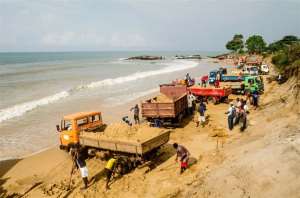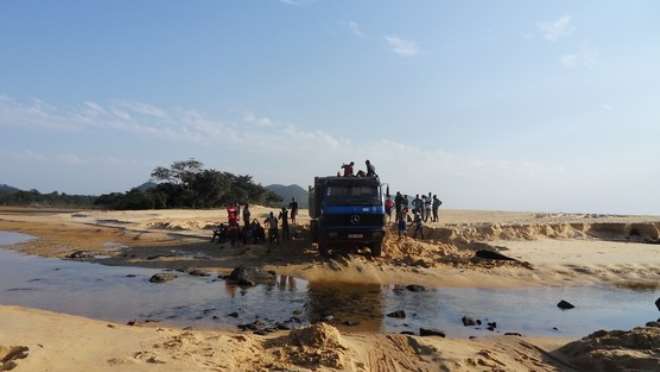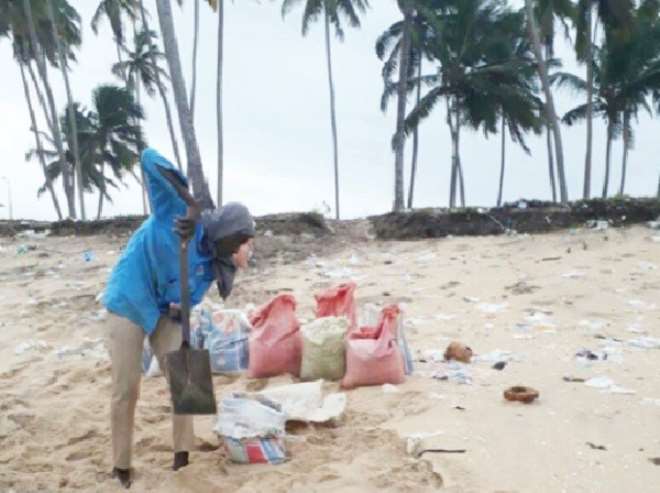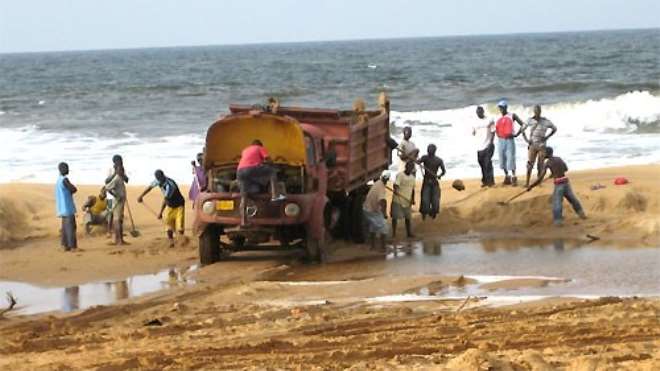
From the coastal plains in the south to the rolling forested hills of the north, are visual feast of the tourism embodiments of the Central Region.
Being the fortress of tourism in Ghana, it remains a firm favourite for holidaymakers craving pristine and disturbance-free time.
Approximately two hours drive west of Accra, is Cape Coast, the capital of the Region. It is strategically positioned and well prepared for your visits with classified accommodation and excellent catering services, established tour operators, efficient transportation and a host of activities.
The facilities are fitted with golf course, sauna and spa providing excellent views of the sea under the shade of palm and coconut trees for a romantic dinner and relaxation. At night, the true beauty of the beaches are revealed in the splendidly decorated beachfront with thatch roofs.
They have scented oil lamps, summer huts and a beautiful bonfire whilst enjoying fresh tilapia, oysters and other seafoods.
It's 168,000-kilometres of Atlantic ocean (Gulf of Guinea) is undulated with batholiths as a dominant feature with stretches of sandy beaches intermittently separated by cliffs or rock outcrops. In between the hills are valleys of various shapes, some occupied by rivers and streams including the famous Kakum river.
Destruction
However, intensive activities of illegal sand miners at its coastline has exposed tourist facilities and other national edifices to the ravages of the sea.
Consequently, pronounced coastal erosion had washed away some buildings. Coconut trees are seen dented and slanted as a direct effect of the sand winning activities. It is evidently clear that the rate of replenishment of sand from the sea is less than the rate of extraction. The difference manifested itself in the rapid coastal erosion.
Key affected facilities are the numerous historic forts and castles, shrines (posuban) and vibrant markets.
Others are Philip Quarcoo boys school, the old Cape Coast High Court, District Hospital, Bakano Police Station, Castle beach resort and Cape Coast and Elmina Castles.
The rest are Fort Coenraadsburg, Fishermen’s market and Fort Saint Jago all in Elmina, Fort Williams Anomabo, Victoria, Millitary Cemetary, Fort Vredenburgh (English Fort) Komenda, Fort Amsterdam Abandze, Fort Lisdzaamhied (Patience) Apam, Fort Good Hope Senya Bereku, Beach Brenu Akyinim, White Sands Spa and Beach Resort Gomoa Fetteh, the 19th Century Dutch Cemetery Elmina, Eguafo-Dumpow Eco-Heritage Site Eguafo among others.
Nature of sand winning
Investigations revealed different types of sand winning activities based on the demand from the specific end users. Tipper-truck-base sand mining operations were fully commercial ventures undertaken by contractors whose business were solely to supply building materials to builders.
They supplied products within the vicinity of the coast or to locations several kilometres away. These contractors usually engage the services of youth residing in nearby communities to scoop the sand into the trucks for a fee.
In contrast, the operations of low capacity truck-based sand miners span from small-scale non-commercial to large-scale commercial activities making use of small pickup trucks to low capacity non-tipper truck vehicles.
Also others use their personal vehicles to go for beach sand for their own use, or by contractors or block layers who did not have access to tipper trucks and use such vehicles to transport their products.
Sand obtained from manually transported sand mining activities is usually used within the vicinity where it was taken. Coastal residents engage in these activities to satisfy small construction needs.
Some youth within such communities are sometimes paid minimal amounts to provide these building materials to residents who are unable to collect sand personally from the beaches.
With regard to beach gravel and coastal stone quarry operations, contractors usually purchased products along the coasts from residents who would had sorted and graded stones into different size categories.
Affected communities
Communities within Elmina, Cape Coast, Anomabo, Biriwa and Moree are amongst the earliest settlements in Ghana. Houses were mostly constructed with clay and wood before or during the early part of the 16 century.
In recent years, most of these buildings have been renovated making use of concrete blocks moulded with sand. New buildings in these communities are constructed with concrete making use of readily available beach sand to provide affordable housing for residents.
Biriwa
At Biriwa, it was observed that the sand that served as a defence mechanism against the heavy tidal waves had been removed. Such unscrupulous persons used cane baskets to collect gravels from the beach and incoming waves.
However, those engaged in stone quarry obtained their products by chipping the sides of cliffs or breaking beach rocks into smaller sizes for sale.
In a bid to avoid being arrest by authorities, several miners prefered to undertake their activities at night. This was also observed at Kormantse, Saltpond and Mbofra Akyinim, where tipper-truck-base sand mining operations were done without qualms and impunity.
Moree
At Moree, the sand beach was vigorously mined by commercial contractors and or individuals who either packed them in bags before transporting or moulded blocks at the beaches for sale.
About eight tipper truck-base sand mining sites dotted along the coastal stretch from Moree to Elmina coastline. "Some of these sites record in excess of 70 tipper trucks lifting each day", a 45-year-old father of five and block layer confirmed in an interview.
Cape Coast and Elmina
The story was no different in Cape Coast and Elmina as shorelines had risen, showing the increasing the effect of high tidal waves, and posing serious threat to the lives of people living in communities along the affected areas.
The affected communities are Amoakofua, Ahiaboboi, Amanful, Victoria Park, Bakaano, Duakor, OLA, Idun, all in the Cape Coast Metropolis, as well as Iture and the Coconut Grove area at Elmina.
Some communities in the hinterland such as Ankaful and Birimso have also not been left out leaving huge and dangerous tranches and manholes along the banks and coast of the affected areas. Sand winners confirmed that about 20 to 30 trucks of sand are carted both day and night.
Some truck drivers also confirmed they had been arrested before but released adding that "the national task force on sand winning are base in Kasoa and Accra making monitoring difficult."
Assembly members reactions
Mr Benjamin Agbenyeku, the Assembly Member for the Anokyin Fawohodzie Electoral Area confirmed the practice. He explained that, stones that were laid along the coastline some time ago as temporary defence have been stolen.
Sand-winning had been going on for the past 30 years and that sand-winners often carried out their nefarious activities at dawn. According to the Assembly Member, although there were bye-laws prohibiting sand mining which his outfit had made frantic efforts to stop the menace, it was to no avail.
“The heavy tidal waves have destroyed the coconut trees along the beach and the sea that lies far away from the community in some time past is now very close to us, and at the peak period, the waves come to the street”.
According to him, the sand-winners used the sand for laying of cement blocks, which were well patronized by real estate developers and residents in the area, noting that, anytime the perpetrators were arrested by the Police, some influential people in the community pleaded on their behalf for their release.
The Assembly Member appealed to the Cape Coast Metropolitan Assembly to deploy a taskforce to the area, who would constantly monitor the shoreline to halt the practice, while those who would be arrested should be severely punished to serve as a deterrent to others.
He appealed to the Government to expedite action for the construction of a sea defence wall of about seven kilometres, stretching from the Cape Coast Castle to Etrea area to salvage the situation.
Mr Peter Mensah, a Unit Committee Member in the Electoral Area, who corroborated the assertions made by the Assembly Member, alleged that some police personnel after effecting arrest took bribes from the sand-winners and left them to go scot free.
He appealed to the traditional authorities in the area to support the Assembly to curb the menace, noting that the chiefs wielded a lot of respect and influence in the community and their collaboration would make a difference.
He also asked the Assembly to sub-let the areas along the beach to private investors to be used for entertainment spots and shops so as to prevent the menace of sand-winning and open defecation.
Ato Baidoo, a resident of Bakano in Cape Coast, said that, the sand-winning activities continued to occur due to lack of jobs for the youth and asked government to provide employable opportunities for them.
Economics of beach sand mining
The major reason that people gave for engaging in beach sand mining is that ‘there are no jobs. But the activity is illegal!
Others are high profit margins, ease of access to the coast and low environmental awareness of residents were identified as the main reasons why people engage in coastal sand mining.
While sand miners are making monies, beach front tourism facility owners also have to spend huge sums of their revenue for ad-hoc sea defence projects, lest, they lose their entire investments.
Several of these efforts to protect investments along the Cape Coast coastline have had little success as sea defence measures have fallen over sometimes a few weeks after construction.
A few of these failed sea defence measures are located between Ankwanda and Mbofra Akyinim sand mining sites making it obvious the reason for the accelerated erosion.
EPA
An Official of EPA who prefers to be anonymous attributed state of affairs to inadequate staffing, logistics, low penalty regime for offenders and lack of cooperation from the other relevant regulatory bodies.
The prescribed penalty for sand winning offences under Regulation 29 of the Legislative Instrument (L.I) 1652 as penal to deter others.
He indicated that the illegal sand winners operate at night and are armed with deadly weapons thereby making it difficult for the commission to apprehend them,the report captured.
Investors appeal
Investors along the Elimina Beach also appealed to the Police Administration and the Regional Police Command, the Regional Security Coordinating Council to revamp SWAT to defend the coastlines of Ghana.
Mr Ben Aidoo, Chairman of the Central Region Branch of the Ghana Hoteliers’ Association, also expressed sort about the practice saying sand winning at beaches in the Region was not only destroying the beaches but also hotels, restaurants and other properties along the coast.
He said there was the need to protect and manage the hospitality industry to open more job avenues and estimated that the industry employs about 42,000 people with 33,000 of the number being full time employees and the rest part time and casual or temporary employees.
Other investors of beach front facility and some coastal communities said they had been left with no option than to undertake their own forms of coastal defence when they experience the wrath of the Atlantic Ocean. Such practices are not sustainable, since the measures which are usually undertaken do not agree with the wider coastal geomorphology and tend to exacerbate the situation.
At these current rates of coastline erosion and activities of sand miners, several communities are going to be made more vulnerable to flooding in the years to come.
The central government will then be called upon to salvage the situation. It just does not make practical and economic sense to spend huge amounts of monies on coastal defence projects without eliminating the major human factors that cause them.
There is the need for more concerted efforts by all stakeholders; including community members and leaders, local assemblies, the Environmental Protection Agency (EPA), the Ghana Police Service, etc. Currently, the EPA and the Ghana Police Service have not been able to collaborate effectively to deal with this serious national issue.
I often wonder what it takes to arrest and prosecute these environmental offenders? These people operate in our towns; they pass through police checkpoints. They undertake these activities mostly in broad daylight.
The excuse of under capacity and lack of equipment does not suffice here. Why can’t we arrest some of these contractors and offenders, prosecute them, sell their trucks and punish them with some community service (let them clean the beaches)? These will obviously serve as a deterrent.
Recommendations
In response to both the positive and negative effects of sand winning, it is proposed that the activity should not be continued but with ecological considerations, Again, awareness campaigns should be instituted now whilst alternative sites are found for the activity.
There should be alternation of the Sand winning activities along the coast to minimize damage and allow the sea to replenish the lost sand. The sand winning industry must be institutionalized with the District Assembly at the centre of operation.
In the long run, there is the need for the establishment of an Environmental Committee to be set up to streamline all activities on the environment whilst making efforts with other bodies to reclaim and rehabilitate the beaches.
There is widespread coastal sand and stone mining taking place along most part of the coastline of Cape Coast. The estimated levels of sand lost to sand mining activities are substantial and sand mining activities are directly related to the rate of local coastline erosion.
The main areas of concern along the coastline of Cape Coast are the Mbofra Akyinim and the Amoakofua mining sites. At the current level of sand mining, the Cape Coast area may eventually experience a loss of most recreational beaches which may lead to a loss of the beach tourism industry as well as make coastal communities vulnerable to flooding.
Until the causal factors of erosion are dealt with, the government will just be wasting resources in undertaking costly engineering-based sea defence projects to protect communities.







 Dumsor: Don't rush to demand timetable; the problem may be temporary — Atik Moha...
Dumsor: Don't rush to demand timetable; the problem may be temporary — Atik Moha...
 Space X Starlink’s satellite broadband approved in Ghana — NCA
Space X Starlink’s satellite broadband approved in Ghana — NCA
 2024 election will be decided on the grounds of the economy; choice of running m...
2024 election will be decided on the grounds of the economy; choice of running m...
 Dumsor: We're demanding less; just give us a timetable — Kwesi Pratt to ECG
Dumsor: We're demanding less; just give us a timetable — Kwesi Pratt to ECG
 Do I have to apologise for doing my security work, I won’t – Simon Osei-Mensah r...
Do I have to apologise for doing my security work, I won’t – Simon Osei-Mensah r...
 All my businesses have collapsed under Akufo-Addo — NDC Central regional chair
All my businesses have collapsed under Akufo-Addo — NDC Central regional chair
 Military, Prison Officers clash in Bawku, three injured
Military, Prison Officers clash in Bawku, three injured
 GRA-SML contract: MFWA files RTI request demanding KPMG report
GRA-SML contract: MFWA files RTI request demanding KPMG report
 Court threatens to call second accused to testify if NDC's Ofosu Ampofo fails to...
Court threatens to call second accused to testify if NDC's Ofosu Ampofo fails to...
 Family accuses hospital of medical negligence, extortion in death of 17-year-old...
Family accuses hospital of medical negligence, extortion in death of 17-year-old...
